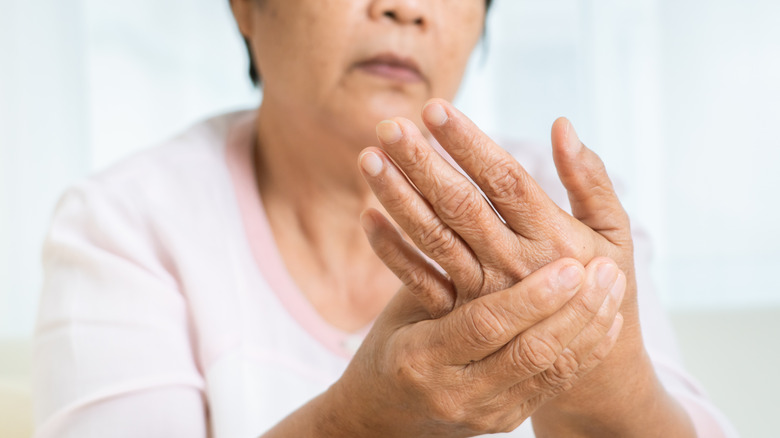Common Triggers Of Rheumatoid Arthritis Flare-Ups
When you suffer from rheumatoid arthritis (RA), flare-ups can disrupt simple daily activities. RA is an autoimmune and inflammatory disease that causes pain in joints that is accompanied by stiffness, swelling, and fatigue, per the Centers for Disease Control and Prevention. While experts know what causes RA, triggers for flare-ups are another story, because they can be different for everyone. The best way to cope with flares is to identify your triggers, so you may be able to control them.
One trigger is stress. The Arthritis Foundation reports that when you're stressed, your body releases certain chemicals that increase pain. In addition, stress stimulates the body's inflammatory response, and that can also cause pain. Since RA is caused by inflammation, any kind of stress can make symptoms worse. Practicing relaxation techniques can help you cope with stressors. While it sounds counterintuitive, exercise can help alleviate stress. You can also talk with a professional who might be able to help you manage stress in your life.
Diet and weather also contribute to flares
Your diet can play a part in how often you experience flare-ups. Eating anti-inflammatory foods is one way you may be able to keep symptoms at bay. Fruits, vegetables, cold-water fish, lean meat, and whole grains are good food choices. However, it is important to pay attention to your symptoms in relation to your diet because some foods, such as red meat and gluten, can cause a reaction in some people, per Rheumatoid Arthritis.
Also, certain weather conditions can worsen RA symptoms. The reason why is not exactly clear, but experts note that when the barometric pressure changes, our tendons, muscles, tissue, and bones contract and expand. Cold weather thickens the fluids around joints which makes them stiff and painful, which explains why winter is worse for people with RA. If cold weather triggers a flare-up, wear warm clothing that includes a hat, scarf, and gloves. You might also want to take vitamin D during the winter months, as low levels of this vitamin have been linked to an increase in RA symptoms. Warm showers and baths may also help (via Medical News Today).


